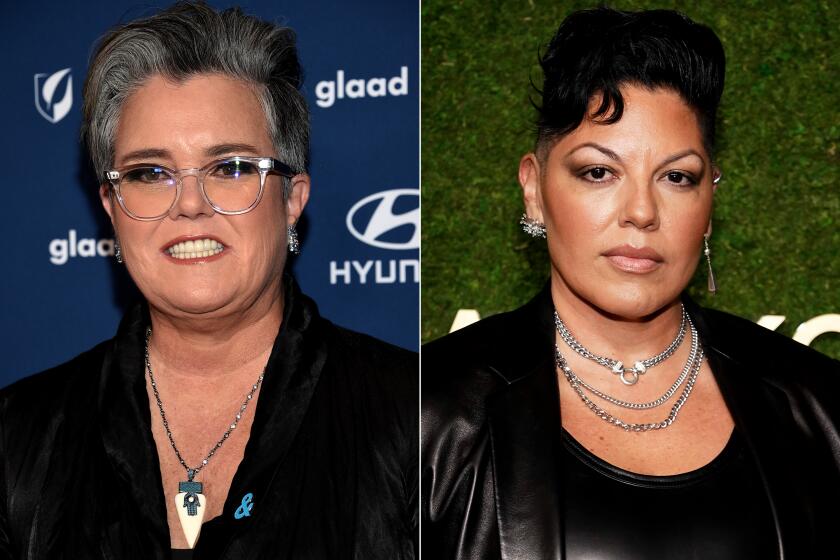It’s Not HBO; It’s TV That’s Different
Television folk like to point out that theirs is a truly democratic medium, in the sense that anyone can vote daily via the remote control--no butterfly ballots required.
The corollary of this is that everyone feels qualified to opine about TV, especially when an event rolls around like Sunday’s Emmy Awards--a showcase inviting media outlets that don’t regularly stoop to acknowledge television to discover it, as if that box in their living rooms suddenly sprouted a head and began demanding attention. Perhaps not surprisingly, the angle many casual observers have awakened to is that HBO--a pay cable channel--wins a lot of awards.
What is it about HBO, these drive-by aficionados of pop culture want to know? Is it the language? The nudity? The bada they add to their bing that the Jurassic old broadcast networks--knuckling under to advertisers--can’t? And what’s wrong with those networks, anyway, which don’t dominate ratings or awards as they once did?
Others proffer conspiracy theories, among them whether HBO somehow hypnotizes easily manipulated members of the Academy of Television Arts & Sciences--the people who select Emmy winners--with glitzy premieres, slick ad campaigns and mantle-worthy packaging of its videotapes. (Based on this assumption, academy voters should begin craving Taco Bell--you want a Burrito Supreme--any second now.)
Yet like most things TV-related these days, finding answers isn’t simple, and even posing the question--pitting pay TV against “free, over-the-air networks”--warrants a bit of explanation.
Like the song says, nobody rides for free, and increasingly, nobody watches TV that way either. Only about one in five U.S. households currently gets television free in the no-cable, no-satellite-dish sense of the term. As a result, even the free networks aren’t really, especially for those who subscribe to cable or buy a dish in part to obtain decent reception of broadcast signals.
Moreover, all of those networks have a vested interest in cable. So if you’re not tuned to CBS, the network’s parent company, Viacom, still wins if you watch Nickelodeon, MTV, TNN, BET or Showtime.
From that perspective, the market share for the networks can dwindle--which shouldn’t be unexpected when most people receive 80-plus channels--while the aggregate reach of the few companies that own them, thanks to consolidation of ownership, remains largely undiminished.
As for the perceived worth of the major networks, one need only see the way people react when deprived of them--as Time Warner subscribers were a few years ago when the cable operator briefly dropped ABC in the midst of a contractual spat--to gauge the value people attach to favorite programs.
We’re not accustomed to thinking this way, but what would viewers pay if told that was the only way they could see this week’s season premieres of NBC’s “The West Wing,” “ER” and “Friends”? Would they part with a few bucks a month if that was the only way to continue their weekly fix of CBS’ “CSI: Crime Scene Investigation,” “Survivor” and “Everybody Loves Raymond”? Maybe even ante up for ABC’s “Alias” to see Jennifer Garner look pensive?
This isn’t meant to take anything away from HBO, which, in baseball parlance, has a batting average that would put it in the hall of fame.
It’s also fair to say this has relatively little to do with language and nudity, or Showtime--the pork of premium television, as in “the other pay channel”--would be up to its eyeballs in glittering paperweights too.
Still, the major networks play a very different game, operating under a business model that requires them to churn out a higher volume of original programming and amass the widest audience, viewing awards and critical adulation as a bonus, not an end in itself.
By contrast, HBO’s marketing strategy involves creating a drumbeat any sentient creature would be hard-pressed to miss--a siren song that says those not anteing up for the channel risk being mocked and ridiculed if they draw a blank expression when “Curb Your Enthusiasm” or “Six Feet Under” are referenced at catered parties and pricey piano bars.
In that respect, HBO has brilliantly tapped into the snobbery that exists vis-a-vis television, positioning itself between feature films (the ones that aspire to win Oscars, not mollify teenage boys) and TV--a medium elitists normally admit to watching only when the surf is about to wash away their beach house or a raging brush fire threatens to consume their hillside retreat.
The channel’s slogan, “It’s not TV. It’s HBO,” reinforces this image. You can almost hear the refrain above the clinking wine glasses: “TV? Oh, heavens no, I don’t watch TV. I do love ‘The Sopranos,’ though.”
Perhaps foremost, being a subscription service affords HBO the luxury of being able to patch together a programming quilt to satisfy customers, rather than aspire to be all things to all (demographically desirable) people, as the broadcast networks do. Under this formula, it’s fine if mostly women watch “Sex and the City,” teens view a Britney Spears concert, men catch the De La Hoya-Vargas fight, lonely men stay up late for “G-String Divas,” and pretty much all of them watch “The Sopranos”--just as long as they keep dutifully subscribing.
In that context, it’s actually remarkable that one broadcast network, NBC, continues to pace the HBO juggernaut, tying for the most awards at this year’s Emmys. Although the networks bluster and moan about cable’s encroachment in this arena, they can’t ignore our award-obsessed culture, as the allure of seeing stars communicate without a script causes new made-for-TV events to keep springing up like weeds.
All that’s missing, in fact, is an annual telecast honoring the best in award shows. Some proposed categories: Most irreverent: MTV Video Music. Most popular: Oscars. Best dressed: Tonys. Least dressed: (tie) Grammys and Latin Grammys. Most Neurotic Presenting Body: Screen Actors Guild.
So HBO is right when the channel asserts that it’s not TV in the conventional sense. What TV-watchers-come-lately overlook is that if your point of reference is the world baby boomers grew up in, when three networks towered above all, then TV isn’t really TV anymore, either.
*
Brian Lowry’s column appears Wednesdays. He can be reached at brian.lowry@latimes.com.
The complete guide to home viewing
Get Screen Gab for everything about the TV shows and streaming movies everyone’s talking about.
You may occasionally receive promotional content from the Los Angeles Times.



